He cannot be reasoned with. He cannot be bribed. He cannot be deterred from his purpose. Even the most heartfelt of entreaties means nothing to him. In other words: pleading with him for your life will not work. If you are on his list – and sometimes even if you are not – he will find you, and you will die. He is human, yes. But humans are supposed to possess at least some sense of compassion, whereas he apparently has none. And you can forget about forestalling him by tracking him down first, because he can vanish like a ghost into nothing, only to turn up right behind you when you least expect it.
This frightening individual is Anton Chigurgh, the self-serving hitman in Cormac McCarthy’s novel of crime in Texas [1]No Country For Old Men. The author supplies us with no physical description of Chigurgh, and has deliberately created his name to be ethnically ambiguous. This is of course intentional, as it builds on the effect of Chigurgh being untraceable, even in police and civic records. What motivates others in the story – the weakness in the moment for the opportunity to possess instant wealth, or even for receiving payment for a killing – are not Chigurgh’s motivations. In fact, we are never entirely sure what does motivate him, which only has the effect of making him seem even more dangerous.
To relate this post to my [2]previous post, the book’s moral voice, and the counterbalance to Chigurgh, is the laconic county sheriff. Nearing retirement, Ed Tom Bell is a pillar of decency and personal integrity, a man who stands by his principles of serving his community and the cause of justice. Sheriff Bell holds determinedly onto those ideals, even as the book’s landscape darkens around him into nightmare, with Chigurgh seeming ever more like a ghost as events in the lives of the other characters begin seriously to unravel.
Bell is the fictional sheriff of Terrell County, which (as its [3]inhabitants can verify) is real enough, and lies in southwest Texas against the border with Mexico. It is this interface with borders, not just on the map, but within ourselves, that is a further theme of the book. At what point do we consider ourselves to have crossed the line? In what moment of time have we strayed over what is safe for us – and for those who care for us – in pursuit of the lure of some desire? And having crossed that line, can we make it back safely or not? Inevitably, the further into the unknown we venture, the more hazardous is the journey back, if it can be made at all.
The hazard is Chigurgh, waiting for us to make that crossing, waiting for us to get careless, to be fallibly [4]human. And that is what lies at the heart of the story: the illusion that we are in control of things. As with the Vietnam veteran Llewelyn Moss, who finds himself caught up in the story’s events, we like to think that we are in control. Of course we do. A feeling of having control over events, over our lives, is a reassuring thing. It gives us a sense of purpose, of being able to predict what will happen tomorrow. Usually, of course, things do pan out as planned. Tomorrow happens, and what we had expected to happen also happens. But not always. Life has a way of walking up to you in the street and hitting you hard for no good reason. You go down, you hit the ground thinking whoa, I didn’t see that one coming. It is in such moments that we learn just how illusory our control over things really is.
No Country For Old Men is not about life. It is life, with all its uncertainties and unexpected twists and irrational endings that we neither had foreseen nor wished for ourselves. The thing is: Chigurgh always catches up with us in the end. He’s out there somewhere, waiting. But Sheriff Bell sets us the example. Standing there in the darkening shadows, it is how we acquit ourselves that counts, even though we know that our name is on Anton Chigurgh’s list.
Hawkwood
Notes:
[1] The book’s title is taken from the opening lines of W.B. Yeats’ poem Sailing to Byzantium – a poem from a Nobel laureate who himself created new borders for contemporary writing, weaving myth, folklore and the commonplace into a seamless whole.
[3] In 2010 the population of Terrell County was 984, which decreased to 914 in 2012. Source: United States Census Bureau, Department of Commerce.
[4] No, I’m not going to tell you about the coin toss incident, although it does point to the one chink of light for Chigurgh’s intended victims. But I decided from the get-go that this post would contain no spoilers!
My post focuses on Cormac McCarthy’s novel, but clearly I cannot let things pass without mentioning the Coen Brothers’ exceptional film version of the book. Not only does the film have a pitch-perfect cast, including Tommy Lee Jones as Sheriff Bell, Josh Brolin as Llewelyn Moss and Javier Bardem as a truly blood-chilling Anton Chigurgh, but whole passages of McCarthy’s characters’ gritty dialogue made it intact onto the screen.


















































































No comments:
Post a Comment
You are welcome to share your thoughts.